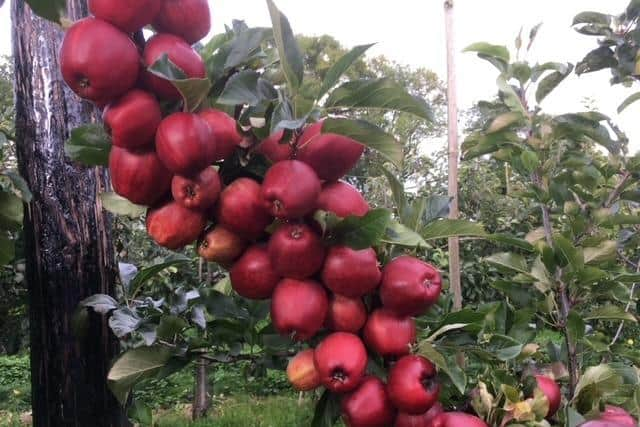Fruit that doesn’t disappoint
and live on Freeview channel 276
Over 3,000 acres of orchards are maintained in Northern Ireland, mainly within a few miles of Loughgall, where the soil type and micro climate are perfect for apple production.
While the main apple variety grown is the cooking variety Bramley, it’s peculiar genetic make-up means that all Bramley orchards have to be inter-planted with other apple varieties, which will pollinate the flowers in spring. Bees and other pollinating insects are heavily relied upon to enable cross fertilisation, a critical aspect in producing a high yielding crop.
Advertisement
Advertisement
Growing consistently high yields of dessert apples in local orchards is quite a challenge and it is very difficult to obtain uniformly sized, blemish-free fruit, with a smooth skin finish. Subsequently, many of our locally grown dessert apples are used to make apple juice.


However, some growers are producing dessert apples very successfully for the retail market using new, and improved varieties, which, when grown under high intensity (1,000 trees/acre) hedgerow systems, can produce consistent yields of high-quality fruit.
When I was a child, I remember that one of the varieties grown to pollinate the Bramleys in our orchard, was an apple called Red Victoria. It was an old cooking apple, which was first cultivated in 1884. Red Victoria was a very attractive apple, with a bright red, glossy skin, however, it had a most bitter and unpleasant taste when eaten freshly from the tree.
I remember my late father telling me that a customer bought a box from him, packed them into small plastic bags, and sold them in a local market as dessert apples. Not surprisingly, he had a few very disgruntled customers when he arrived back in the market a week later!
Advertisement
Advertisement
My dad’s story about the Red Victoria apples reminds me of that famous story, which we read about in Genesis chapter 3. Here, Eve, followed by Adam, yielded to the temptation to eat fruit, which seemed attractive to them, but which had been forbidden by God. The result was that sin entered the world and the relationship between God and man was broken. Sadly, no matter how each one of us have lived our lives, no matter how decent, honest, or ‘religious’ we may be, that initial sin implicates us all.
In Romans 3:23, we read “for all have sinned and fall short of the glory of God”. But thankfully, through the sacrificial life of the Lord Jesus Christ, who died to take our sins away, the story doesn’t end there, as we can know God’s true forgiveness and the promise of eternal life in heaven.
In life, we can get drawn into situations, relationships, or habits which, like buying a bag of Red Victoria apples, seem attractive and good at the time, only to be disappointed. But if we come to Christ and repent of our sins, He will gladly forgive and receive us. In John 1:12 we read “yet to all who did receive Him, to those who believed in his Name, He gave the right to become children of God”. Why don’t you come to Him today? You will not be disappointed!
David is married to Pauline and they have four grown up children. Since retiring from the Grass Breeding Department at AFBI Loughgall, he grows Bramley apples which he supplies to local processors and packers. David is a member of Loughgall Presbyterian Church.
Advertisement
Advertisement
If you would like to talk to someone about any of the issues raised in this article, please email Rev Kenny Hanna, PCI’s Rural Chaplain at [email protected] or call him on 07938 488 372.